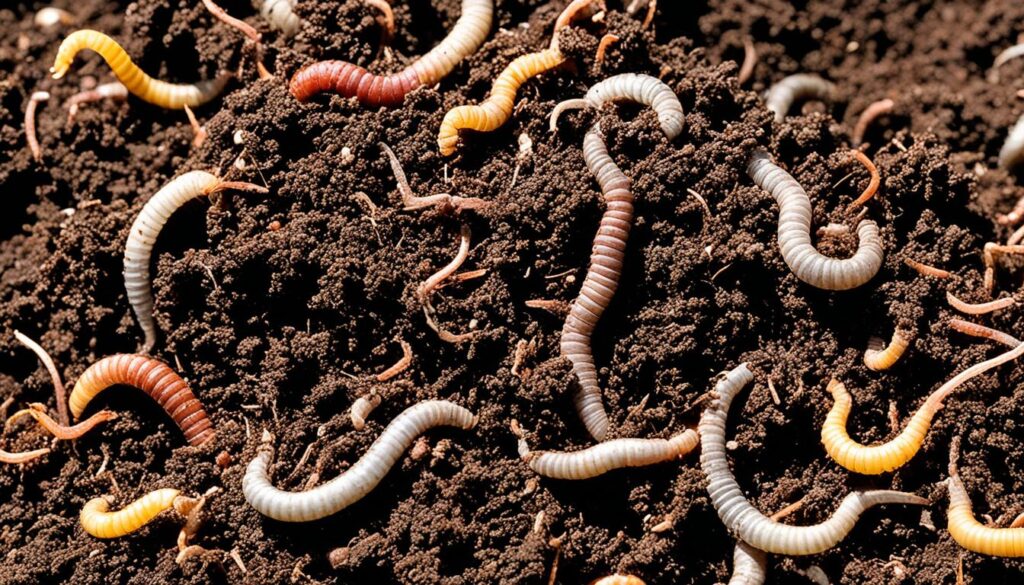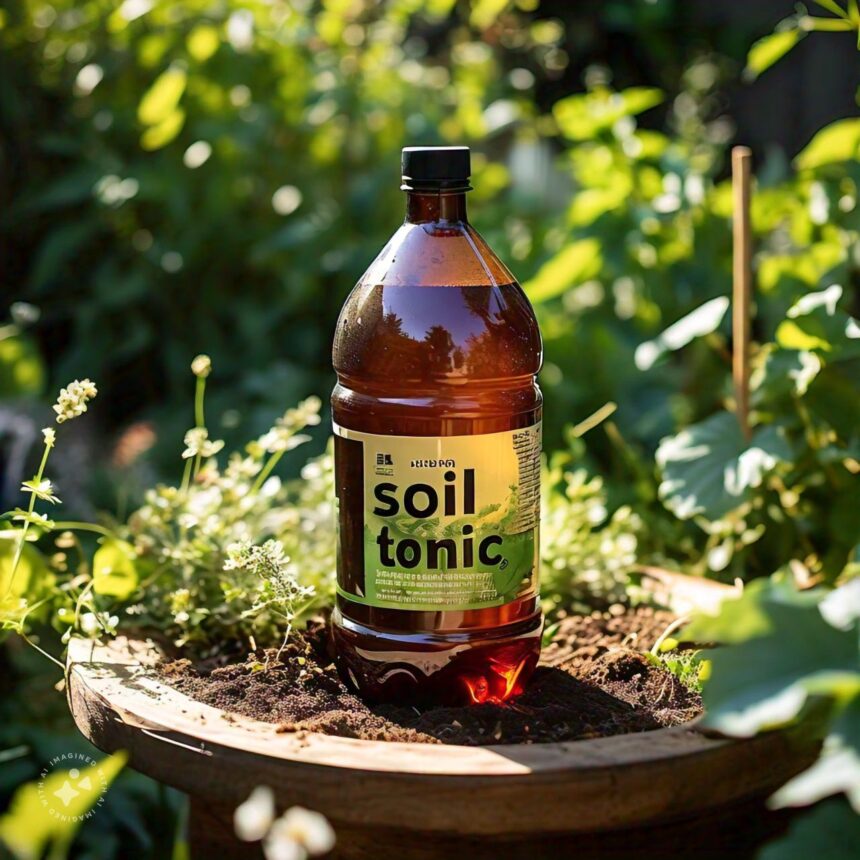Just as a tonic revitalizes and enhances the body’s vitality, soil tonics play a major role in enriching and revitalizing the health of your garden.
These natural soil solutions act as nourishing supplements, enhance growth and nutrient uptake, and promotes a thriving ecosystem within your garden beds.
Discover how incorporating soil tonics can rejuvenate your gardening experience, offering the essential nutrients and support needed for lush, vibrant plants to flourish.
Let’s get right at it!
What are Soil Tonics?
Soil tonics are natural supplements designed to enhance the vitality and productivity of garden soil. They organic composts, compost teas, natural fertilizers like fish emulsion or seaweed extracts, and even beneficial microorganisms such as mycorrhizal fungi and soil probiotics.
And sometimes specific nutrients that contribute to soil fertility and plant health.
Synthetic fertilizers provide immediate nutrients but may deplete soil health over time.
The ingredients in soil tonics work synergistically to create a balanced and thriving soil ecosystem, much like how vitamins and nutrients in our diet contribute to our overall well-being.
Benefits Of Soil Tonics
Soil tonics offer a range of benefits that can significantly enhance the health and productivity of your garden. Here’s a detailed look at how they contribute to plant growth:
1. Enhance Nutrient Absorption in Plants
Soil tonics enhance nutrient absorption in plants by:
- Balancing Soil pH: Many soil tonics help to regulate the pH levels of the soil, creating an optimal environment for nutrient absorption. When the pH is balanced, nutrients like nitrogen, phosphorus, and potassium become more accessible to plants.
- Providing Micronutrients: Certain tonics, such as compost teas and organic fertilizers, enrich the soil with a wide range of micronutrients that are vital for plant health.
- Enhancing Microbial Activity: Soil tonics rich in beneficial microorganisms, like mycorrhizal fungi and soil probiotics, establish symbiotic relationships with plant roots. These microbes help break down organic matter and release nutrients in plant-available forms.
2. Promote Robust Root Development
Soil tonics contribute to robust root development by:
- Stimulating Root Growth: Organic soil tonics contain growth-promoting substances that encourage the development of extensive root systems. This allows plants to access water and nutrients more effectively, even during periods of drought or stress.
- Enhancing Root Structure: Tonics that improve soil structure and aeration create a favorable environment for root penetration and expansion.
- Reducing Transplant Shock: When applied during transplanting or seeding, soil tonics can reduce transplant shock by promoting rapid root establishment and minimizing root disturbance.
3. Improve Soil Structure and Water Retention
Soil tonics contribute to soil health by enhancing its physical properties, such as structure and water retention capacity:
- Improving Soil Texture: Organic matter-rich tonics, such as compost and compost teas, improve soil structure by increasing aggregation and friability. This allows for better root penetration and air circulation within the soil.
- Increasing Water Holding Capacity: Tonics that improve soil structure also enhance water retention capacity. They help soils retain moisture for longer periods, reducing the frequency of irrigation and drought stress on plants.
- Reducing Soil Erosion: Well-structured soils are less prone to erosion by wind and water, preserving soil fertility and preventing nutrient runoff.
4. Foster a Thriving Garden Ecosystem
Soil tonics support the overall health and diversity of the garden ecosystem by:
Supporting Plant Diversity: Healthy soil supported by tonics allows for diverse plantings and crop rotations. This diversity enhances garden resilience, reduces pest and disease pressures, and improves overall ecosystem stability.
Encouraging Beneficial Microorganisms: Tonics containing beneficial microbes, such as compost teas and biological inoculants, promote the growth of beneficial bacteria and fungi in the soil. These microbes contribute to nutrient cycling, disease suppression, and overall soil fertility.
Attracting Beneficial Insects: Organic gardening practices supported by soil tonics attract beneficial insects, such as pollinators and natural predators of garden pests. This creates a balanced ecosystem that reduces the need for chemical pesticides.
Types of Soil Tonics
Tonics come in various forms, each offering unique benefits to the soil and plants.
Here’s a closer look at some common types of soil tonics and how they contribute to a thriving garden ecosystem:
1. Organic Compost and Compost Tea
Organic compost is often referred to as “black gold” in gardening circles. It is made from decomposed organic matter such as kitchen scraps, yard waste, and plant material.
When added to the soil, compost enriches it with essential nutrients like nitrogen, phosphorus, and potassium, improving overall soil fertility.
Compost tea is a liquid extract made by steeping compost in water. This tea is teeming with beneficial microorganisms and nutrients leached from the compost. It’s an excellent way to deliver concentrated nutrients directly to plant roots and foliage.
2. Natural Fertilizers like Fish Emulsion and Seaweed Extracts
Fish emulsion is a natural fertilizer made from fish waste, usually fish parts that are not used for human consumption. It’s rich in nitrogen, phosphorus, and trace minerals, making it an excellent choice for promoting vigorous plant growth and green foliage.
Fish emulsion is typically diluted with water and applied as a liquid fertilizer, providing an immediate nutrient boost to plants.
Seaweed extracts are derived from various types of seaweed and kelp. They are prized for their high concentration of micronutrients, growth hormones (like cytokinins), and beneficial plant compounds.
Seaweed extracts stimulate root growth, improve plant resistance to stress, and enhance overall plant health. They can be applied as a foliar spray or soil drench, offering plants a quick and effective way to absorb nutrients.
3. Beneficial Microorganisms: Mycorrhizal Fungi and Soil Probiotics
Mycorrhizal fungi form a symbiotic relationship with plant roots, extending their root systems and enhancing nutrient uptake. These fungi colonize plant roots and help plants access nutrients like phosphorus and water more efficiently.
Soil probiotics refer to beneficial bacteria and other microorganisms that improve soil health and support plant growth. These microorganisms break down organic matter, release nutrients in plant-available forms, and suppress harmful pathogens.
Soil probiotics can be found in commercial products or enhanced through practices like cover cropping and reduced tillage, which encourage microbial activity in the soil.

Crafting Soil Tonics at Home
Gardeners can make their own nutrient-rich soil tonics at home. One way is by brewing worm casting tea, a liquid fertilizer. This is done by steeping worm castings in water. As they soak, beneficial microbes grow, making a tonic that feeds plants directly.
This tonic can be used as a root drench or foliar spray. It helps plants grow and keeps them safe from pests and diseases.
DIY: Brewing Nutrient-Dense Worm Casting Tea
To make a nutrient-rich worm casting tea, you need a few things:
- Worm castings (also known as vermicompost)
- A large container or bucket
- Cheesecloth or a fine mesh strainer
- Water
Here’s how to brew your own worm casting tea:
- Add 1 cup of worm castings to a 5-gallon bucket or container.
- Fill the bucket with water, leaving a few inches at the top.
- Let the worm castings steep for 12-24 hours, stirring now and then.
- Strain the mixture through a cheesecloth or fine mesh strainer to remove solids.
- The liquid left is your worm casting tea, ready for your plants.
You can use this tea as a soil drench or foliar spray. Apply it directly to the leaves and stems of your plants. It will give them a quick boost of nutrients, helping them grow well in your garden.
Conclusion
Incorporating soil tonics into your gardening routine can make a world of difference in the health and productivity of your plants.
By carefully selecting the right soil tonic based on your plant’s needs, conducting soil tests, and considering organic options, you can effectively enhance nutrient absorption, promote robust root development, and improve overall soil structure.
Embrace the magic of soil tonics and watch as your garden flourishes with vitality and vibrancy season after season.





